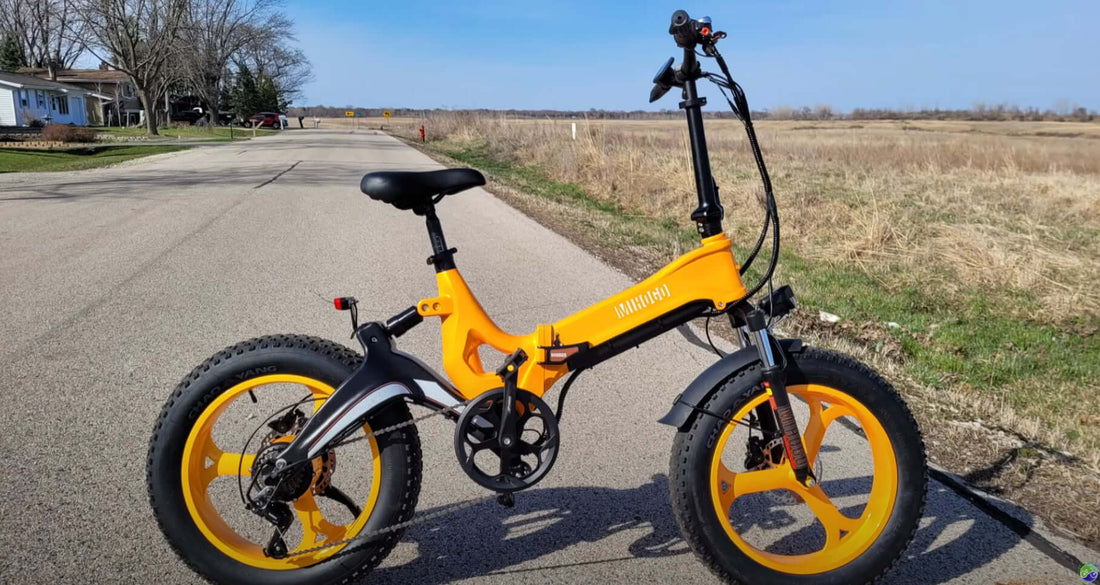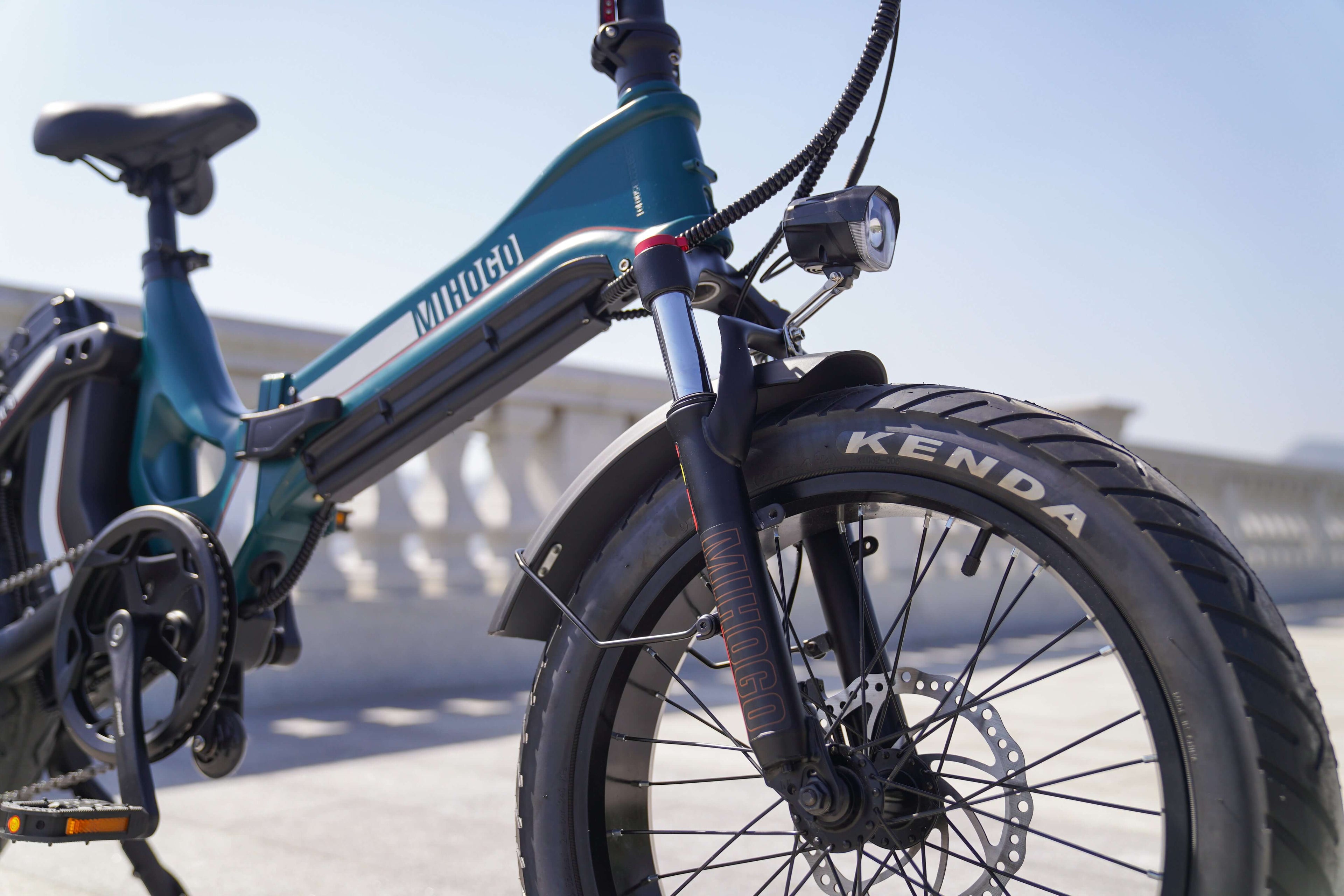Understanding E-bike Power Systems: The Foundation of Reliable Performance
Modern electric bikes like Mihogo's advanced models feature sophisticated electrical systems designed for optimal performance and safety. Understanding how these components work together helps you quickly identify and resolve power interruption issues.
Core Components of Mihogo E-bike Power Systems
Battery Management System (BMS): Every Mihogo e-bike incorporates an intelligent BMS that monitors cell voltages, temperature, and current flow. This system protects your battery by cutting power when it detects unsafe conditions, which can sometimes appear as unexpected shutdowns.
Motor Controller: Acting as the brain of your e-bike, the controller regulates power flow from the battery to the motor. Mihogo's advanced controllers feature multiple safety protocols that may trigger power cuts to protect components.
Electrical Connections: High-quality waterproof connectors ensure reliable power transmission throughout your ride. However, loose or corroded connections remain a common cause of intermittent power loss.
Common Causes of E-bike Power Interruptions
Battery-Related Power Cuts
Low Battery Voltage: The most frequent cause of power cutouts occurs when battery voltage drops below safe operating levels. This typically happens when the battery charge falls below 20%, especially under high load conditions like climbing hills or accelerating rapidly.
Mihogo Solution: All Mihogo models feature intelligent battery indicators and low-voltage warnings. The Air Max's dual battery system with 1386Wh capacity provides exceptional range, reducing the likelihood of voltage-related cutouts.
Battery Management System Protection: Your BMS continuously monitors individual cell voltages. When one cell group drops too low or experiences voltage sag under load, the BMS cuts power to prevent damage.
Troubleshooting Steps:
- Check battery charge level using the display
- Allow the battery to rest for 10-15 minutes after a cutout
- Verify all battery connections are secure
- Test the bike on flat terrain with moderate assistance
Temperature-Related Shutdowns: Extreme temperatures can trigger BMS protection. Cold weather increases battery internal resistance, while hot conditions can cause thermal protection activation.
Prevention Tips:
- Store your Mihogo e-bike in moderate temperatures (10-25°C)
- Allow batteries to warm up gradually in cold weather
- Avoid charging in extreme temperatures
Motor and Controller Issues
Motor Overheating: Sustained high-power operation, especially on steep inclines or with heavy loads, can cause motor overheating. Modern motors like those in Mihogo models feature thermal protection that cuts power when temperatures exceed safe limits.
Symptoms:
- Power cuts during climbing or high-speed riding
- Temporary loss of assistance that returns after cooling
- Motor housing feels extremely hot to touch
Solutions:
- Reduce assistance level on steep climbs
- Take breaks during intensive riding
- Check motor ventilation for debris blockage
Controller Malfunction: The controller manages power delivery and can cut output when it detects electrical anomalies, overheating, or communication errors with sensors.
Diagnostic Steps:
- Check for error codes on the display
- Inspect controller housing for damage or overheating
- Verify all sensor connections
- Reset the system by turning off and disconnecting battery for 30 seconds
Electrical Connection Problems
Loose or Corroded Connections: Vibration during riding can gradually loosen electrical connections, causing intermittent power loss. Corrosion from moisture exposure creates resistance and voltage drops.
Inspection Points:
- Battery terminals and connections
- Motor cable connections
- Display and sensor wiring
- Charging port integrity
Maintenance Solutions:
- Regularly inspect and tighten connections
- Clean terminals with contact cleaner
- Apply dielectric grease to prevent corrosion
- Replace damaged connectors promptly
Mihogo-Specific Troubleshooting Solutions
Air Max Advanced Diagnostics
The Mihogo Air Max features sophisticated diagnostics through its intelligent app connectivity. When experiencing power cuts:
- Check App Diagnostics: Use the Mihogo app to review system status and error codes
- Dual Battery Management: Verify both batteries are functioning correctly through the display
- Torque Sensor Calibration: Ensure dual-arm torque sensors are properly calibrated
- Smart Features Check: Confirm GPS tracking and proximity unlocking aren't causing interference
One Utility Model Solutions
The versatile Mihogo One's robust motor and cargo capabilities require specific attention:
High-Load Protection: When using cargo accessories, the system may cut power to prevent overload:
- Verify load doesn't exceed 300kg total capacity
- Check that cargo is properly distributed
- Reduce assistance level when heavily loaded
Multi-Mode Diagnostics: Test each of the five pedal assist modes individually to isolate issues:
- Start with Eco mode for basic functionality
- Gradually increase assistance levels
- Note if cutouts occur at specific power levels
Mini Compact Model Troubleshooting
The Mihogo Mini's compact design requires attention to specific areas:
Folding Mechanism Connections: Ensure folding joints don't stress electrical connections:
- Check cable routing through folding points
- Verify connections remain secure when folded/unfolded
- Inspect for cable wear at stress points
350W Motor Thermal Management: The efficient brushless motor includes thermal protection:
- Allow cooling periods during intensive use
- Check ventilation openings for obstructions
- Monitor motor temperature during extended rides
NX Adventure Model Solutions
The powerful Mihogo NX with its 750W motor and dual battery option requires robust troubleshooting:
High-Power System Management:
- Verify both batteries are balanced and healthy
- Check for 37.5A current spike protection activation
- Monitor battery voltage under high load conditions
Fat Tire Considerations:
- Ensure proper tire pressure for efficient operation
- Check wheel alignment and bearing condition
- Verify motor mounting is secure
RX 2.4 Urban Explorer Diagnostics
The stylish RX 2.4 features sophisticated urban-focused technology:
Magnesium Frame Integration: Check electrical integration points:
- Inspect frame-integrated wiring
- Verify battery mounting security
- Test suspension components for electrical interference
50-Mile Range Optimization: Maximize system efficiency:
- Calibrate range estimations through the app
- Monitor real-world consumption patterns
- Adjust riding habits for optimal performance
Advanced Diagnostic Techniques
Voltage Testing Under Load
Using a multimeter, measure battery voltage during power cuts:
- Resting Voltage: Check voltage with system off (should match battery specifications)
- Load Voltage: Measure voltage during acceleration or climbing
- Recovery Voltage: Check voltage after load removal
Normal behavior: Voltage should drop under load but recover quickly Problem indicators: Excessive voltage drop (>5V) or slow recovery
Current Draw Analysis
Monitor current consumption patterns:
- Normal riding: 5-15 amperes
- Hill climbing: 20-30 amperes
- Maximum acceleration: Up to 40 amperes briefly
Sustained high current draw indicates system stress that may trigger protection cutouts.
Temperature Monitoring
Check component temperatures during operation:
- Battery: Should remain below 45°C
- Motor: Normal operating temperature varies but shouldn't exceed 80°C
- Controller: Should have adequate cooling and ventilation
Preventive Maintenance for Reliable Performance
Battery Care Best Practices
Charging Habits:
- Charge to 100% regularly for cell balancing
- Avoid deep discharge below 20%
- Use only Mihogo-approved chargers
- Charge in moderate temperatures
Storage Protocols:
- Maintain 40-80% charge for long-term storage
- Store in cool, dry environments
- Check charge levels monthly during storage
- Perform full charge cycles quarterly
Electrical System Maintenance
Connection Care:
- Monthly inspection of all electrical connections
- Clean terminals with appropriate contact cleaner
- Apply dielectric grease to prevent corrosion
- Tighten connections to manufacturer specifications
Cable Management:
- Inspect cables for wear, damage, or stress points
- Ensure proper routing without sharp bends
- Secure cables to prevent movement during riding
- Replace damaged cables immediately
Software and Firmware Updates
Regular Updates: Keep your Mihogo e-bike's software current:
- Check for app updates monthly
- Install firmware updates when available
- Reset system after updates if recommended
- Document any changes in performance after updates
When to Seek Professional Help
Warning Signs Requiring Expert Attention
Immediate Professional Service Required:
- Burning smells from any component
- Visible sparking or electrical arcing
- Battery swelling or deformation
- Repeated cutouts despite troubleshooting
- Error codes not covered in user manual
Safety First: Never attempt repairs on damaged batteries or high-voltage systems. Mihogo's authorized service network provides expert diagnostics and genuine parts replacement.
Warranty Considerations
Covered Issues: Most power interruption problems related to manufacturing defects are covered under Mihogo's comprehensive warranty:
- Battery management system failures
- Controller malfunctions
- Defective wiring harnesses
- Motor thermal protection issues
Documentation: Keep detailed records of power interruption incidents, including:
- Date, time, and riding conditions
- Battery charge level when cutout occurred
- Temperature conditions
- Any error codes displayed
- Steps taken to resolve the issue
Emergency Procedures and Safety Protocols
Immediate Response to Power Loss
Safe Stopping:
- Gradually reduce speed using mechanical brakes
- Signal lane changes and move to safe location
- Activate hazard lights if equipped
- Check for immediate safety hazards
System Reset Procedure:
- Turn off the e-bike completely
- Disconnect battery for 30 seconds
- Reconnect battery ensuring secure connection
- Power on and test basic functions
- Ride cautiously to test stability
Emergency Riding Mode
Manual Pedaling: All Mihogo models remain fully functional as traditional bicycles:
- Shift to appropriate gear for manual pedaling
- Account for additional weight when planning routes
- Conserve energy for potential longer rides home
- Use bike lights for visibility
Range Extension Tips if power is intermittent:
- Reduce assistance level to minimum
- Maintain steady, moderate pace
- Avoid unnecessary acceleration
- Plan route to minimize hills
Technology Integration and Smart Features
App-Based Diagnostics
Mihogo Smart App Benefits:
- Real-time system monitoring
- Error code interpretation
- Performance history tracking
- Remote diagnostics capability
- Maintenance scheduling
Data Analysis: Use app data to identify patterns:
- Cutout frequency vs. riding conditions
- Battery performance trends
- Motor efficiency metrics
- Component temperature logging
GPS and Security Features
Anti-Theft Integration: Ensure security features don't interfere with power systems:
- Verify proximity unlocking functions correctly
- Check GPS tracking doesn't drain battery excessively
- Test remote locking mechanisms
- Monitor app connectivity stability
Environmental Factors and Seasonal Considerations
Weather-Related Precautions
Cold Weather Operation:
- Allow battery to warm up before riding
- Expect reduced range in cold conditions
- Check tire pressure more frequently
- Store bike in heated areas when possible
Hot Weather Precautions:
- Avoid direct sunlight exposure during storage
- Monitor component temperatures more closely
- Increase cooling break frequency
- Ensure adequate ventilation around motor and battery
Wet Weather Considerations:
- Verify all seals and covers are secure
- Dry bike thoroughly after wet rides
- Check electrical connections for moisture
- Avoid riding through standing water
Long-term Performance Optimization
Riding Habit Adjustments
Efficient Power Management:
- Use appropriate assistance levels for conditions
- Anticipate stops to reduce hard braking
- Maintain steady speeds when possible
- Plan routes considering topography and battery capacity
Load Management:
- Distribute cargo weight evenly
- Stay within manufacturer weight limits
- Remove unnecessary accessories when not needed
- Consider aerodynamic impact of accessories
Component Upgrade Considerations
Performance Enhancements: When considering upgrades:
- Consult Mihogo technical support for compatibility
- Use only approved components and accessories
- Consider professional installation for complex upgrades
- Document modifications for warranty purposes
Conclusion: Ensuring Reliable E-bike Performance
Power interruptions in your Mihogo e-bike, while frustrating, are usually preventable through proper maintenance and understanding of system operation. Most cutout issues stem from battery-related problems, electrical connection issues, or component protection features working as designed.
Regular maintenance, proper charging habits, and attention to environmental factors significantly reduce the likelihood of unexpected power loss. When issues do occur, systematic troubleshooting using the techniques outlined in this guide helps quickly identify and resolve problems.
Remember that modern e-bikes like Mihogo models incorporate sophisticated safety systems designed to protect components and ensure rider safety. Many apparent "problems" are actually protection features working correctly. Understanding these systems helps distinguish between normal operation and genuine malfunctions requiring attention.
For persistent issues or complex problems beyond basic troubleshooting, Mihogo's professional service network provides expert diagnostics and repairs using genuine parts. Regular professional maintenance, combined with attentive home care, ensures years of reliable electric cycling enjoyment.
Your Mihogo e-bike represents a significant investment in sustainable transportation and recreational freedom. With proper care and understanding of its systems, power interruption issues become rare occurrences rather than regular frustrations, allowing you to focus on enjoying the remarkable experience of electric cycling.
Whether you're navigating urban commutes with the practical One model, exploring long-distance tours with the high-capacity Air Max, or tackling off-road adventures with the robust NX, understanding your e-bike's power systems ensures confident, reliable performance for every journey.
External Resources:
- Electric Bicycle Wikipedia - Comprehensive information about e-bike technology and systems
- Battery Management System Fundamentals - Technical details about BMS operation and protection features
- REI E-bike Troubleshooting Guide - Professional guidance on e-bike maintenance and care






